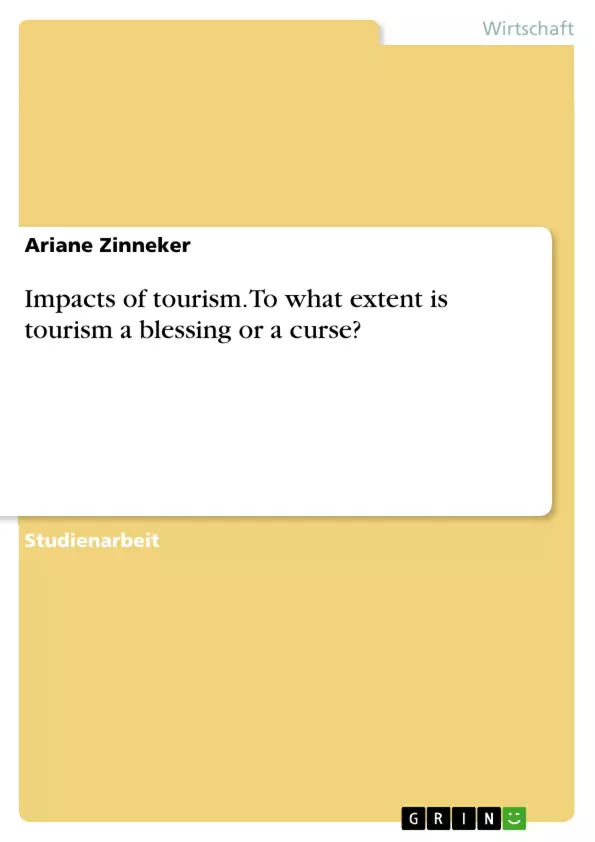In this assignment important positive and negative impacts will be discussed by using particular sources of experts in order to analyze the question of ‘to what extent is tourism a blessing or a curse?’.
The topics of UNESCO sites, wildlife-tourism, authenticity, sex tourism, volunteer tourism and sustainability are being taken into consideration in order to analyze the tourism.
Referring to the guest lecture of Carol Westrik, tourists can be a big advantage to keep especially UNESCO heritage sites in good conditions. To explain this effect, it can be mentioned that lots of tourists visit beautiful natural or interesting cultural places because they are a listed as an UNESCO heritage site. If tourists explore one of these heritage sites and they observe something which is not what they expected, they will get in contact with the UNESCO. Because of a complaint, UNESCO will get in touch with the site and the consequence is that the site has to react.
Logically all the listed heritage sites do not want to receive complaints and so they protect their places and take care of them. Hence, tourists travelling to UNESCO world heritage sites are a blessing to all those beautiful places. On the other hand through the high amount of tourists the sites need the protection they maybe would not need when not being on the UNESCO list (Westrik, 2015).
Inhaltsverzeichnis
- Introduction
- Tourism
- A blessing or a curse?
- Wildlife-Tourism
- Authenticity
- Sex Tourism
- Volunteer Tourism
- Sustainability
- Conclusion
Zielsetzung und Themenschwerpunkte
Die Arbeit untersucht den Einfluss der Tourismusindustrie auf die Welt, indem sie positive und negative Auswirkungen auf Umwelt, lokale Bevölkerung und Wirtschaft analysiert. Die Forschungsfrage lautet: Inwieweit ist der Tourismus ein Segen oder ein Fluch für die Welt? Die Analyse umfasst verschiedene Themengebiete, darunter UNESCO-Welterbestätten, Wildlife-Tourismus, Authentizität, Sextourismus, Freiwilligenarbeit im Tourismus und Nachhaltigkeit.
- Die Auswirkungen des Tourismus auf UNESCO-Welterbestätten
- Die ethischen Aspekte des Wildlife-Tourismus
- Die Bedeutung von Authentizität im Tourismus und ihre Folgen
- Die Problematik des Sextourismus und seine Auswirkungen auf die lokale Bevölkerung
- Die Chancen und Herausforderungen des Freiwilligen Tourismus
Zusammenfassung der Kapitel
- Introduction: Die Arbeit stellt die Forschungsfrage und die Themengebiete vor, die im Detail behandelt werden.
- Tourism - A blessing or a curse?: Das Kapitel untersucht den Einfluss des Tourismus auf UNESCO-Welterbestätten und zeigt sowohl positive als auch negative Aspekte auf.
- Wildlife-Tourism: Dieses Kapitel analysiert die Auswirkungen des Wildlife-Tourismus auf Tiere, insbesondere auf Elefanten, sowie auf die Entwicklung von Nationalparks und lokale Gemeinden.
- Authenticity: Das Kapitel diskutiert die Suche nach Authentizität im Tourismus und beleuchtet, wie diese sowohl positive als auch negative Folgen für lokale Kulturen und Lebensweisen hat.
- Sex Tourism: Dieses Kapitel betrachtet die Problematik des Sextourismus, insbesondere die sexuelle Ausbeutung von Kindern, und zeigt die negativen Auswirkungen auf lokale Gemeinschaften auf.
- Volunteer Tourism: Dieses Kapitel analysiert die Chancen und Risiken des Freiwilligen Tourismus und untersucht, inwieweit er tatsächlich eine positive Wirkung auf lokale Gemeinden und die Umwelt hat.
- Sustainability: Das Kapitel befasst sich mit den Nachhaltigkeitsaspekten des Tourismus und zeigt die negativen Folgen des hohen Energieverbrauchs und der Umweltbelastung auf.
Schlüsselwörter
Die Arbeit konzentriert sich auf die Themen Tourismus, Nachhaltigkeit, UNESCO-Welterbestätten, Wildlife-Tourismus, Authentizität, Sextourismus, Freiwilligenarbeit im Tourismus, Umweltbelastung, lokale Bevölkerung, kulturelle Auswirkungen, ethische Aspekte, ökonomische Auswirkungen und die Auswirkungen auf lokale Gemeinden.
- Quote paper
- Bachelor Ariane Zinneker (Author), 2015, Impacts of tourism. To what extent is tourism a blessing or a curse?, Munich, GRIN Verlag, https://www.grin.com/document/381409



